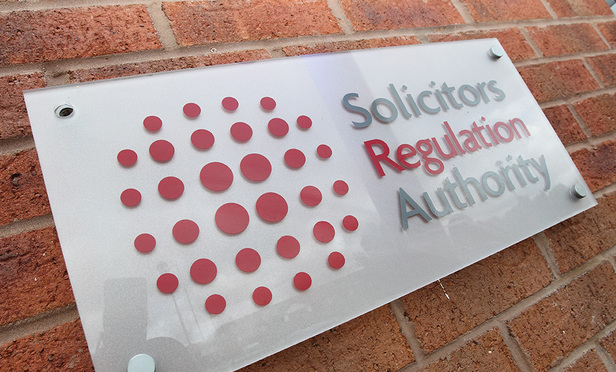The UK's New Regulatory Code Where Firms Carry the Can
Legal professionals and their employer firms must heed the writing on the wall in this week's new set of standards — the SRA's regulatory focus has shifted.
November 18, 2019 at 06:01 AM
4 minute read
 Solicitors Regulation Authority
Solicitors Regulation Authority
The Solicitors Regulation Authority (SRA) will launch its new set of Standards and Regulations (often referred to as the "StaRs") on November 25, 2019.
Unsurprisingly, there are some changes in content and structure due to the simplification and rationalisation of the existing rules, but it is actually the more nuanced changes, in terms of underlying policy and overall regulatory approach, which firms and lawyers should be focusing on. For the StaRs really usher in a new era in legal regulation, where there will be a distinct shift in the SRA's priorities as a regulator and in what it expects of the firms it regulates.
A key change is that there will be greater emphasis in future on the ethical obligations of firms the SRA regulates. The seven SRA Principles set out the high-level standards of ethical behaviour expected.
Crucially, these principles will apply both in respect of professional life and, where appropriate, life outside of work, and they apply to all those the SRA regulates – individual solicitors, registered European lawyers, registered foreign lawyers, and law firms, as well as all their non-solicitor employees (including those with management responsibilities).
The SRA's ambition is to create an ethical culture within firms, where everyone is encouraged to become more aware of their ethical obligations and the need to be able to exercise professional judgement and be accountable for their own actions. Firms will be expected to support all their staff to comply with these obligations and to foster a firm culture based upon them.
On top of this, by creating a separate Code of Conduct for Firms and simplifying the Code of Conduct for Individuals, the message is quite clear that the SRA expects all those it regulates to understand what is expected of them.
In this new world, there will be very little room for excuses premised upon a lack of understanding as to the applicable ethical and professional obligations. The days are long gone when a firm might have been able to turn a blind eye to the suspect conduct of its employees or managers on the basis that responsibility to take any actions lays solely at the door of the SRA. Going forward, the SRA expects firms to take more responsibility for the actions or inactions of employees and to promote a culture where allegations of misconduct are taken seriously and investigated at firm level, and where prompt and early engagement with the SRA becomes routine practice.
The teeth in all of this comes in the guise of the SRA's revised Enforcement Strategy, launched in February 2019, which signposted what the SRA sees as the 'big ticket' issues, and where the SRA intends to focus its regulatory action.
It includes detail of what the SRA will take into account when determining the seriousness of any concerns raised about a failure to meet its standards and makes clear that the purpose of the principles and the codes of conduct is to show "what a competent and ethical legal profession looks like". It leaves no doubt that its regulatory approach is to "promote a culture in which ethical values and behaviours are embedded"; in fact, this is one of three main objectives, alongside ensuring a strong, competitive and highly effective legal market; and ensuring a focus on quality and client care.
So, legal professionals and their employer firms must heed the writing on the wall – regulatory focus has shifted. While individuals must still comply with their professional and ethical obligations, a clear responsibility will be placed at the door of firms to promote a culture where individuals are empowered to make good decisions and are able to justify why they made them.
This is already evident, arguably, in recent enforcement action the SRA has taken, where firms are carrying the can. Under the new StaRs regime, this is only likely to happen more.
Iain Miller is a partner and Jessica Clay a senior associate in the legal services regulatory team at Kingsley Napley.
This content has been archived. It is available through our partners, LexisNexis® and Bloomberg Law.
To view this content, please continue to their sites.
Not a Lexis Subscriber?
Subscribe Now
Not a Bloomberg Law Subscriber?
Subscribe Now
NOT FOR REPRINT
© 2025 ALM Global, LLC, All Rights Reserved. Request academic re-use from www.copyright.com. All other uses, submit a request to [email protected]. For more information visit Asset & Logo Licensing.
You Might Like
View All

Pallas Partners Founder On the Disputes Trends to Look Out For in 2025
4 minute read
What to Expect From Teresa Ribera, the EU‘s New Competition Commissioner
6 minute readTrending Stories
- 1People in the News—Jan. 30, 2025—Rubin Glickman, Goldberg Segalla
- 2Georgia Republicans Push to Limit Lawsuits. But Would That Keep Insurance Rates From Rising?
- 3Trending Issues in Florida Construction Law That Attorneys Need to Be Aware Of
- 4The Importance of Judicial Elections
- 5Ephemeral Messaging Going Into 2025:The Messages May Vanish But Not The Preservation Obligations
Who Got The Work
J. Brugh Lower of Gibbons has entered an appearance for industrial equipment supplier Devco Corporation in a pending trademark infringement lawsuit. The suit, accusing the defendant of selling knock-off Graco products, was filed Dec. 18 in New Jersey District Court by Rivkin Radler on behalf of Graco Inc. and Graco Minnesota. The case, assigned to U.S. District Judge Zahid N. Quraishi, is 3:24-cv-11294, Graco Inc. et al v. Devco Corporation.
Who Got The Work
Rebecca Maller-Stein and Kent A. Yalowitz of Arnold & Porter Kaye Scholer have entered their appearances for Hanaco Venture Capital and its executives, Lior Prosor and David Frankel, in a pending securities lawsuit. The action, filed on Dec. 24 in New York Southern District Court by Zell, Aron & Co. on behalf of Goldeneye Advisors, accuses the defendants of negligently and fraudulently managing the plaintiff's $1 million investment. The case, assigned to U.S. District Judge Vernon S. Broderick, is 1:24-cv-09918, Goldeneye Advisors, LLC v. Hanaco Venture Capital, Ltd. et al.
Who Got The Work
Attorneys from A&O Shearman has stepped in as defense counsel for Toronto-Dominion Bank and other defendants in a pending securities class action. The suit, filed Dec. 11 in New York Southern District Court by Bleichmar Fonti & Auld, accuses the defendants of concealing the bank's 'pervasive' deficiencies in regards to its compliance with the Bank Secrecy Act and the quality of its anti-money laundering controls. The case, assigned to U.S. District Judge Arun Subramanian, is 1:24-cv-09445, Gonzalez v. The Toronto-Dominion Bank et al.
Who Got The Work
Crown Castle International, a Pennsylvania company providing shared communications infrastructure, has turned to Luke D. Wolf of Gordon Rees Scully Mansukhani to fend off a pending breach-of-contract lawsuit. The court action, filed Nov. 25 in Michigan Eastern District Court by Hooper Hathaway PC on behalf of The Town Residences LLC, accuses Crown Castle of failing to transfer approximately $30,000 in utility payments from T-Mobile in breach of a roof-top lease and assignment agreement. The case, assigned to U.S. District Judge Susan K. Declercq, is 2:24-cv-13131, The Town Residences LLC v. T-Mobile US, Inc. et al.
Who Got The Work
Wilfred P. Coronato and Daniel M. Schwartz of McCarter & English have stepped in as defense counsel to Electrolux Home Products Inc. in a pending product liability lawsuit. The court action, filed Nov. 26 in New York Eastern District Court by Poulos Lopiccolo PC and Nagel Rice LLP on behalf of David Stern, alleges that the defendant's refrigerators’ drawers and shelving repeatedly break and fall apart within months after purchase. The case, assigned to U.S. District Judge Joan M. Azrack, is 2:24-cv-08204, Stern v. Electrolux Home Products, Inc.
Featured Firms
Law Offices of Gary Martin Hays & Associates, P.C.
(470) 294-1674
Law Offices of Mark E. Salomone
(857) 444-6468
Smith & Hassler
(713) 739-1250









